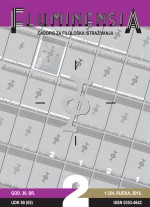TERMINOLOGICAL COLLOCATIONS AND TERM VARIATION IN MECHANICAL ENGINEERING DISCOURSE
Keywords:
terminological collocations, term variation, variant types, substitutabilityAbstract
Terminological collocations are one of the most typical and very frequent units of representation of concepts in many disciplines. Although traditionally considered to be unwelcome in terminology, synonymy is amply present in specialized languages. Consequently, the same phenomenon is reflected in terminological collocations. This paper aims to investigate synonymous collocations extracted from mechanical engineering texts in terms of the most frequent and relevant types of denominative variation in the selected English collocations as well as of their equivalents in German and Croatian. The analysis of variations in terminological collocations gives insight into the (non)substitutability of collocation constituents as one of the major characteristics of collocations. Extracted collocations are analysed within a two-tier framework structured at a paradigmatic and a syntagmatic level, which allows for the identification of the three types of term variation: morphological, syntagmatic and semantic. Focusing on the collocations with the structure noun + noun and adjective + noun the results show that constituents of both syntactic structures allow substitution. The denominative variants are prevalent in adjective + noun collocations in which synonymous lexical elements functioning as collocates do not entail a concept change (admissible load ↔ allowable load). Lexeme substitutions are also annotated in noun + noun collocations expressing a slightly different dimension or facet of the concept (face gear vs. crown gear vs. crown wheel). The majority of German equivalents are nominal compounds that outnumber their morphological variants offering multiple equivalences.

